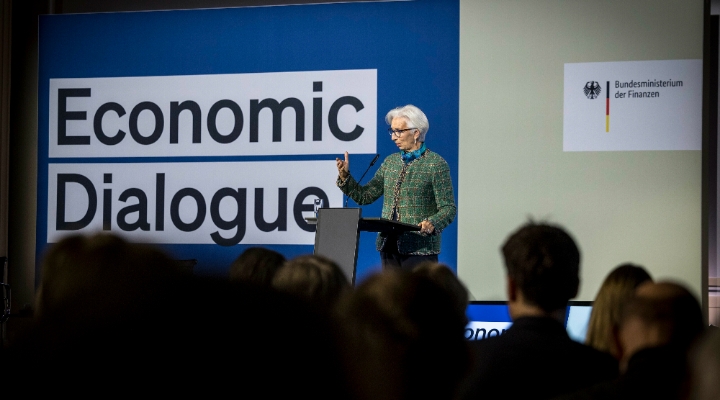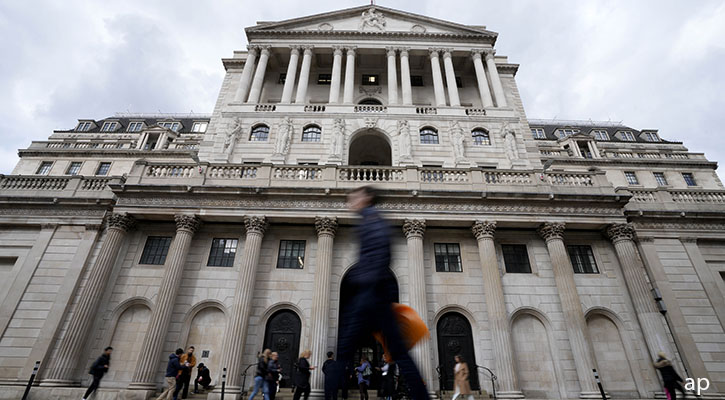
The European Central Bank (ECB) will almost certainly keep key interest rates unchanged Thursday, but market observers will still be looking for forward guidance on when its governing council might take a more dovish stance in the first half of 2024.
Swaps markets are pricing in a high likelihood of the first cut of 25 basis points by March and the euro has been under pressure against the US dollar in the face of these expectations, as have European bond yields.
When Will The ECB Cut Rates?
Council member Francois Villeroy de Galhau stressed in a recent interview with French newspaper La Depeche du Midi that the bank is done raising rates and will look at cuts at some point in 2024, unless there are any "major surprises", Bloomberg reports.
"We expect the ECB to fall short of providing guidance on the timing of the first policy rate cut beyond the near future while repeating its call for a data-dependent approach. This will leave a Q2 24 rate cut as the most likely scenario for the next policy rate change," Dankse Bank said in a December 8th ECB Preview.
A survey by Reuters of 90 economists showed the majority expects rate cuts before the ECB's July meeting. In a previous poll in November, the majority of 55% saw rates to stay unchanged at least until mid-2024.
A lot has changed in the past weeks, says Michael Field, Morningstar's European market strategist.
"Inflation in Europe had been running higher than in the US, but with European rates down to 2.4% in November, we are not that far anymore from the ECB's targeted level," he says.
"All along central banks had been warning that getting inflation down is the main reason for keeping rates high. But with rates now close to targeted levels, there is less of a reason for the highest rates we've had in 15 years to be maintained." Rates were pushed down by volatile energy prices, which retreated significantly year on year.
The ECB's executive board member Isabel Schnabel called the inflation reading a "pleasant surprise" and "encouraging", but also cautioned against declaring victory against inflation too early.
"We continue to expect an uptick over the coming months," she said in an interview with Reuters.
"There's going to be a reversal of some fiscal measures and of some base effects, and we cannot exclude that there's going to be a new price spike in energy or food."
Field agrees the fight is not yet over.
"There is still a risk of inflation rising again. Energy prices have the potential to spike over the winter, and labour markets remain tight across the board, raising the potential for further wage increases over the next year, which could push up inflation," he says.
"Central banks are very aware of this risk, particularly in the US, with the economy still running hot."
Has The ECB Overtightened?
Not so in the eurozone, whose economy shrank in Q3, while gross domestic product (GDP) contracted by 0.1%. It now looks like it will do the same in the last three months of 2023, falling into a continent-wide recession. In fact, the ECB is the central bank most likely to have overtightened; and possibly to a significant extent, says Quentin Fitzsimmons, senior portfolio manager at T. Rowe Price.
Europe's largest economy Germany is already back in a technical recession. Real GDP contracted by 0.1% in Q3 2023 as consumer demand weakened and external demand from Germany's trading partner countries softened.
And fiscal tightening following a Constitutional Court ruling is likely to weigh on domestic demand too: on 15 November 2023, the Court ruled the use of borrowing authorisations by funds operating outside the central government's core budget need to be reflected in central government debt brake calculations.
This has torn a deep hole in the budget planning for 2024 and will have severe implications for the country’s fiscal spending – and GDP growth. Deutsche Bank Research has since downgraded the country's growth forecast for next year by around half a percent to -0.2% on the back of the ruling.
ECB is Not The Only European Central Bank
In the interview with Reuters, Schnabel conceded "some of the hard data we see are not very good", echoing ECB president Christine Lagarde’s words that the bank will take a "data-dependent approach".
Morgan Stanley, meanwhile, says the hold language as well as data dependency will stay. At the same time, the messaging is likely to shift more towards rates being at their peak.
"We expect the first cut in June 2024, conditional on wage data showing some moderation," Morgan Stanley says.
Away from the ECB, other meetings are taking place too. Central bankers will also convene on Thursday in Switzerland, where inflation has been comparatively benign and fallen faster than expected.
"This should give the Swiss National Bank room to signal the focus can shift from potential imported inflation to the negative impact of having a Swiss franc that’s too strong," UBS says in a note dated December 7.
In its own press conference, the SNB is likely to "show a moderation of the inflation outlook and maybe even comment on the recent efforts on foreign reserve sales, which have strengthened the CHF," according to UBS. Economists therefore expect EUR/CHF to bottom out at current levels.


























